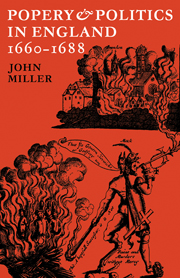Book contents
- Frontmatter
- Contents
- Preface
- Abbreviations
- Note on spellings and dates
- Introduction
- 1 The Catholic laity
- 2 England and Rome: the Catholic clergy
- 3 The penal laws and their enforcement
- 4 The development of the anti-Catholic tradition
- 5 The Restoration settlement and after
- 6 The French alliance and ‘Catholicity’
- 7 York and Danby
- 8 The Popish Plot and the Exclusion Crisis
- 9 The Tory reaction
- 10 James II and the Church of England Men
- 11 James II and the Dissenters
- 12 James II and Rome
- 13 The missionary effort under James II
- 14 The opposition to James II
- Appendices
- Select Bibliography
- Index
3 - The penal laws and their enforcement
Published online by Cambridge University Press: 07 October 2011
- Frontmatter
- Contents
- Preface
- Abbreviations
- Note on spellings and dates
- Introduction
- 1 The Catholic laity
- 2 England and Rome: the Catholic clergy
- 3 The penal laws and their enforcement
- 4 The development of the anti-Catholic tradition
- 5 The Restoration settlement and after
- 6 The French alliance and ‘Catholicity’
- 7 York and Danby
- 8 The Popish Plot and the Exclusion Crisis
- 9 The Tory reaction
- 10 James II and the Church of England Men
- 11 James II and the Dissenters
- 12 James II and Rome
- 13 The missionary effort under James II
- 14 The opposition to James II
- Appendices
- Select Bibliography
- Index
Summary
Between 1559 and 1610 parliament passed a series of acts which together made up a fearsome body of laws against Catholic recusancy and all aspects of Catholic life. If these laws had been fully enforced they would have broken English Catholicism by executions, imprisonment and fines. However, in the sixteenth and seventeenth centuries it was far easier to make a law than to ensure that it was enforced. The ferocious punishments imposed by statute for a wide variety of offences were intended to deter potential offenders and so to compensate to some extent for the gross practical inadequacies of the machinery of law enforcement. There was no effective police force. The central administration was minute by modern standards. Local administration and day-to-day justice were the responsibility of gentlemen amateurs who were unpaid and overworked and retained prejudices and feelings of their own. The inferior officers who were supposed to enforce their orders were all too often inept, underpaid and venal. Communications between the centre and the localities were poor. Therefore it needed constant vigilance and prodding of J.P.s on the part of the Privy Council if the penal laws were to be enforced in the shires. Eyen in the worst times, between about 1580 and 1620, the laws were never enforced to the full, but they were enforced sufficiently to cause considerable distress and inconvenience to Catholics; a number of priests and laymen were executed and others died in prison.
- Type
- Chapter
- Information
- Popery and Politics in England 1660–1688 , pp. 51 - 66Publisher: Cambridge University PressPrint publication year: 1973



